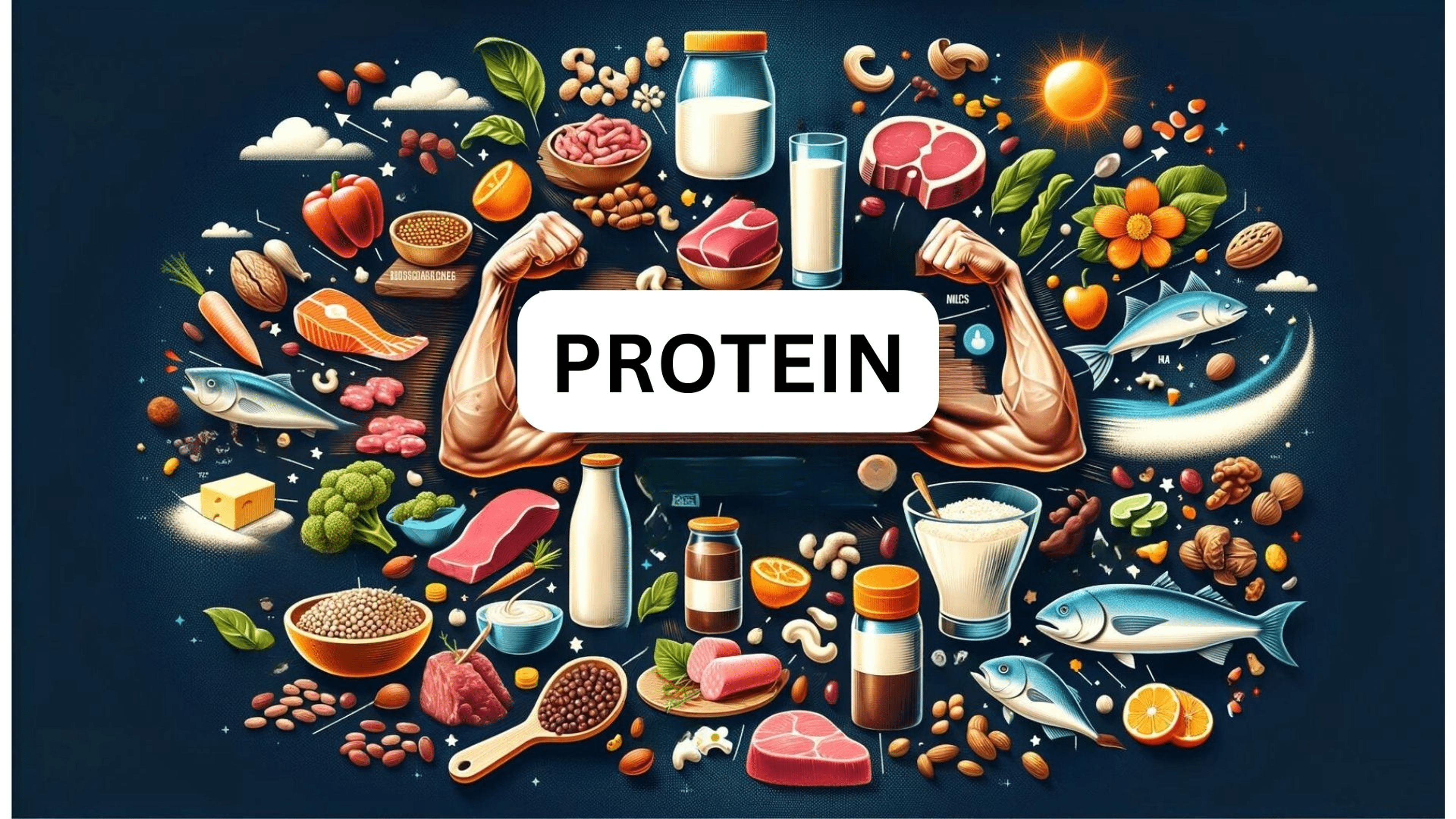Determining how much Protein You Need

Understanding Protein and Its Importance
At its core, protein is a critical macronutrient required by the human body. A complete diet is incomplete without ample protein intake. Unlike fat and carbohydrates, the human body does not store protein; hence it's essential to replenish your body's protein reserves daily.
Protein is composed of smaller molecules called amino acids. There are 20 types of amino acids that combine to form a protein. Nine of these amino acids are essential, meaning they must come from our diet as our bodies cannot produce them.
The Role of Protein in the Body
Protein plays a variety of fundamental roles in the body. Interestingly, every cell in the human body contains protein and it is a major component of all tissues, muscles, skin, and organs.
Protein is required for the structure, regulation, and function of the body’s tissues and organs. It is essential for building and repairing body tissues, aiding muscle contraction, making the bio-chemical enzymes and hormones required for the cognitive processes of the brain, and supporting the immune system by generating antibodies.
Particularly for athletes and individuals involved in intensive physical training, protein plays a critical role in recovering from high-intensity, exhaustive exercise, and in promoting muscle adaption during the recovery period after exercise.
Benefits of Adequate Protein Intake
Regular consumption of adequate protein leads to numerous health advantages.
- It promotes muscle growth and recovery especially in conjunction with physical activity.
- It is crucial in weight management as it can contribute to satisfying hunger, thereby lowering the intake of additional food.
- Adequate levels of protein can promote good skin health and assist in wound healing.
- Perhaps most importantly, protein is vital in maintaining and promoting overall body health at a cellular level.
Sources of Protein
Protein can be derived from both animal-based and plant-based sources. While meat, eggs, and fish are seen as traditional sources of high protein, various plants can also provide ample amounts.
Plant-based protein sources include but are not limited to lentils, chickpeas, peanuts, almonds, spirulina, quinoa, and many others. Also included in this category are soy products such as tofu, tempeh, and edamame.
To ensure you are getting an adequate and complete profile of all the essential amino acids, it is optimal to consume a variety of protein sources in your diet.
In conclusion, understanding and integrating the right amount and type of protein in your diet is fundamental to a well-rounded and responsible approach to personal health and wellbeing. Be sure to consider the wide array of plant-based options along with the traditional animal-based sources to meet your particular dietary and lifestyle needs.
Factors Influencing Protein Needs
The amount of protein an individual needs can be influenced by several factors. These can range from personal biology such as age and gender, to lifestyle aspects such as activity level and exercise intensity. Furthermore, an individual's specific health goals and possible special conditions can dictate unique protein needs. It's important to remember that protein requirements can greatly vary from person to person. This is why establishing one-size-fits-all protein recommendation can be misleading.
Activity Level and Exercise Intensity
Research studies have shown that people involved in intense physical activities, like athletes and fitness enthusiasts, may require more protein than those living sedentary lifestyles. This is because physical activity breaks down muscle tissue, and protein is necessary to repair these tissues and stimulate muscle growth. In fact, a high-protein diet can help speed up recovery after exercise and promote muscle synthesis. However, the amount of protein intake should be balanced with total calorie and nutritional needs to avoid any potential health risks.
Age, Gender, and Muscle Mass Considerations
Age, gender, and muscle mass also play crucial roles in determining protein needs. As we age, our body's ability to effectively use protein can decline, which can potentially lead to muscle loss and a weaker immune system. Adequate protein intake can help mitigate these effects.
For men in general, due to their typically larger size and greater muscle mass compared to women, they might require more protein. But this doesn't mean that women need less protein; their requirements will still depend on their own size, activity level, and health goals.
Moreover, individuals aiming to build muscle mass may have enhanced protein needs. That's because protein serves as the essential building block of muscles.
Health Goals and Special Conditions
Lastly, specific health goals and certain conditions can influence protein needs. For example, individuals aiming for weight loss might want to consume more protein. This is because protein can enhance satiety and regulate blood sugar levels, leading to reduced calorie intake overall.
Alternatively, individuals with certain health conditions such as kidney diseases may need to monitor and limit their protein intake, as a high-protein diet can exacerbate these conditions.
In conclusion, determining your protein needs should sit within a comprehensive assessment of your lifestyle, body composition, activity levels, and personal health goals. Consulting a healthcare provider or a registered dietitian can be beneficial in determining the appropriate level of protein intake.
Calculating Your Protein Requirements
Understanding how to calculate your personal protein needs is imperative not only for maintaining good health, but also for achieving specific fitness and wellness goals. To accurately assess your protein requirements, it's vital to consider general recommendations for protein intake, specific formulas that take into account various factors like activity level, and tips for incorporating protein effectively into your diet. Let's delve into each of these areas for comprehensive understanding.
General Recommendations for Protein Intake
The general recommendation for protein intake, according to the Dietary Reference Intake (DRI), is about 0.36 grams per pound (or 0.8 grams per kilogram) of body weight. This means an average sedentary man might require about 56 grams of protein per day, while a sedentary woman might need about 46 grams. However, these figures may vary widely depending on factors like activity level, age, and health status. Importantly, these are baseline measures -- individuals pursuing high-intensity training or muscle building may require significantly more protein.
Using Formulas to Determine Specific Needs
To fine-tune your protein needs, you may need to delve a bit deeper and consider specific formulas that take into account various individual factors. As a general guideline, individuals engaging in regular endurance or strength-training activities may need anywhere from 1.2 to 2.0 grams of protein per kilogram of body weight. This figure can increase for elite athletes or those engaging in heavy physical labor.
An example of using the formula is as follows: If you weigh 150 pounds (or around 68 kg) and engage in moderate exercise regularly, you might calculate your protein needs this way: 68kg x 1.5g protein = 102 grams of protein per day.
It's important to remember that calculating protein needs isn't an exact science, and individual protein needs can vary greatly. Always listen to your body, pay attention to signs of fatigue, muscle weakness, or slow recovery after workouts, and adjust your protein intake as needed.
Incorporating Protein into Your Diet Effectively
Once you've determined your specific protein needs, it's important to have a strategic approach in incorporating this essential nutrient into your diet.
Here are some tips to effectively incorporate protein in your diet:
-
Distribute your protein intake evenly throughout the day. Rather than consuming large amounts of protein in one or two meals, aim to have a source of protein at each meal and snack to help with the body's absorption and utilisation.
-
Incorporate food sources like lean meats, dairy, eggs, legumes, and plant-based proteins. Consuming a variety of protein sources helps ensure you're also getting a variety of other essential nutrients.
-
Pair protein with fiber-rich foods, healthy fats, and carbohydrates to ensure well-rounded nutrition. This not only boosts overall nutrient intake, but it can also make meals more satisfying and help control hunger.
In conclusion, it's important to remember that protein is only one aspect of a balanced, nutrient-rich diet. So while it's crucial to ensure you're getting enough protein, it's equally important to balance protein with ample intake of other essential nutrients, and to incorporate regular exercise into your weekly routine for optimal health and fitness.
In Summary
To summarise, this blog post shed light on the critical role and benefits of protein in our body, stating it is essential for bodily functions such as building and repairing tissues, aiding muscle contractions, producing necessary biochemicals and hormones for cognitive functions and supporting our immune system. It was emphasized that adequate protein consumption leads to health advantages including muscle growth, weight management, skin health, and most importantly, promoting overall health at a cellular level.
The importance of diverse protein sources was discussed alongside pointing out the factors that influence individual protein needs. These factors can range from age, gender, activity intensity, health goals, and certain health conditions.
Lastly, we explored how to calculate protein requirements using general recommendations and more personalized formulas based on various factors. Tips were provided to integrate protein effectively in your diet.
Plan of action
- Understand your individual protein needs: Apply the formula taking into account various factors like your age, activity level, health goals to calculate your protein requirement.
- Sedentary individuals: 0.36 grams of protein per pound or 0.8 grams per kilogram of body weight.
- Active individuals: 1.2 to 2.0 grams of protein per kilogram of body weight.
- Create a diverse meal plan with adequate protein: Plan a diet involving various sources of protein, both animal-based like lean meats, eggs, fish, and plant-based like lentils, tofu, and almonds. Make sure protein is included in every meal.
- Monitor your body's response: Observe how your body reacts to increased protein. Lookout for signs of fatigue, muscle weakness or slow recovery after workouts which require adjustment to your protein intake. Consult with a healthcare provider if needed.
Just remember, maintaining balanced nutrition and leading an active life is just as important. Keep this plan of action in mind and take one step at a time to a healthier you.




